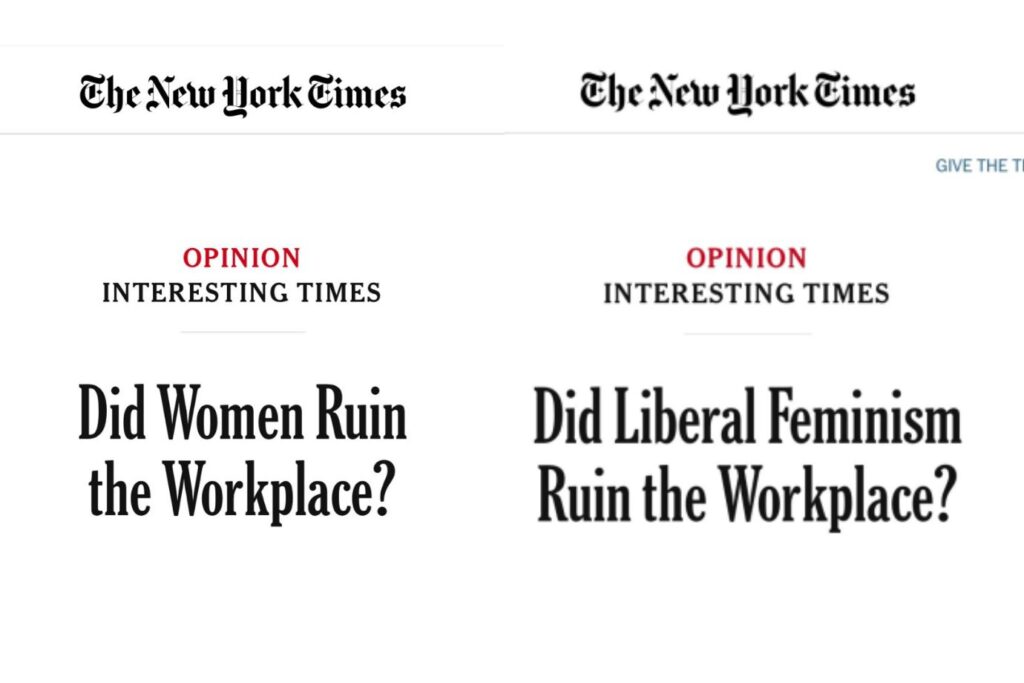Last week, the New York Times, the same paper that once prided itself on journalistic integrity, decided to ask the question: “Did Women Ruin the Workplace?”. No, this isn’t satire. This was a real headline, later changed to the slightly less inflammatory but equally problematic “Did Liberal Feminism Ruin the Workplace?” after the internet (rightfully) erupted in outrage.
The piece featured conservative columnist Helen Andrews, who has made a name for herself by blaming women for everything from the decline of corporate America to the rise of empathy in the workplace. Her essay in Compact Magazine, “The Great Feminization,” argues that women have infiltrated and subsequently weakened institutions like business and law by prioritising empathy over rationality, safety over risk, and cohesion over competition. Because, apparently, caring about people and making thoughtful decisions is now a liability. Who knew?
Let’s be clear liberal feminism is not about coddling feelings or canceling people for sport. It is about advocating for equal rights, bodily autonomy, and the dismantling of patriarchal systems that have historically excluded women from power. It is about ensuring that women can work, lead, and thrive without being reduced to their reproductive capabilities or emotional intelligence. But sure, let’s blame the women for the collapse of capitalism while ignoring the decades of male-dominated leadership that brought us recessions, wars, and climate catastrophe.
Andrews’ essay hinges on the idea that the presence of women in leadership and academia has led to the rise of ‘wokeness’, a term that’s been so overused and misused it’s practically lost all meaning. She cites the resignation of Harvard President Larry Summers in 2006, after he suggested women might be biologically less suited for science and math. According to Andrews, the outrage from female academics was the birth of cancel culture. Because, of course, when women stand up for themselves, it is not called accountability it is called hysteria.
Let’s talk facts. Women now make up the majority of college-educated workers in the U.S. Law schools became majority female in 2016. Medical schools followed suit shortly after. And yet, women still hold only 10 per cent of Fortune 500 CEO positions. The gender pay gap persists, with women earning about 82 cents for every dollar earned by men. And don’t even get us started on the motherhood penalty, where women are penalized professionally for having children, while men are often rewarded for being fathers.
The NYT podcast episode, hosted by Ross Douthat, featured Andrews and fellow conservative writer Leah Libresco Sargeant debating whether liberal feminism has failed women. Spoiler alert: it hasn’t. What has failed women is the persistent belief that our presence in the workplace is a problem to be solved rather than a solution to be embraced. The idea that empathy, safety, and collaboration are weaknesses rather than strengths is not only outdated, it is dangerous.
And let’s not ignore the irony of men complaining that women have made the workplace too ‘feely’ while simultaneously throwing tantrums over being asked how their weekend was (Yes this is what men online complained about under the New York Times article). If your masculinity is so fragile that a Monday morning greeting sends you into a spiral, perhaps the problem isn’t feminism, perhaps the problem is you.
To see a woman like Helen Andrews championing these regressive ideas is particularly disheartening. Internalised misogyny is real, and it’s thriving. But what’s more alarming is that a platform like the New York Times gave this narrative a megaphone. In a time when women’s rights are under attack, from reproductive healthcare to equal pay to representation in leadership, this kind of rhetoric is not just tone-deaf, it’s complicit.
Women have fought tooth and nail to be seen, heard, and respected in the workplace. We are not DEI hires. We are not quotas. We are qualified, capable, and here to stay. And if our presence makes some people uncomfortable, maybe it is time they examine why. The workplace has not been ruined by the presence of women. It has evolved. And evolution, as history has shown us, is often met with resistance by those who fear losing power.
So no, women didn’t ruin the workplace. But we are certainly working hard to fix what was broken long before we got here. And if that means more empathy, more safety, and more collaboration, then yes, we will gladly take the blame.

